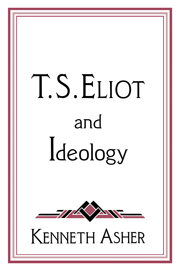6 - Eliot and the New Criticism
Published online by Cambridge University Press: 05 June 2012
Summary
The all-pervasive influence that Eliot sought came not as he had hoped through his social theorizing, which even at its best constituted primarily an eloquent protest against what is rather than a plausible (or for most, desirable) sketch for what might be. Rather, his more durable legacy came in the literary criticism, especially of the early years. This is by no means to say that Eliot failed in his larger aspirations, for as I have tried to show, the early criticism grew out of and embodied extraliterary concerns. Indeed, if one accepts the thesis that Eliot's late Christianity is one with a great deal of political baggage, then there is not a significant difference in ideological assumptions between the early Eliot and the late Eliot, of Eliot the literary critic and Eliot the Christian propagandist. That Eliot should have made his deepest impress when his agenda was most implicit substantiates his retrospective opinion that unpopular revolutionaries need to veil their full intents if they hope to succeed.
The difficulty of isolating the transmission of certain of Eliot's ideas is complicated, though, by the fact that Eliot himself rejects the notion that he has fathered the American New Criticism, the school most commonly seen as, at least in part, his offspring. In 1956, long after New Criticism's theory and practice were well established, Eliot spoke disparagingly of it as “the lemon-squeezer school of criticism” and claimed that beyond giving some of its practitioners voice in the Criterion, he failed “to see any school of criticism which can be said to derive from myself.”
- Type
- Chapter
- Information
- T. S. Eliot and Ideology , pp. 133 - 159Publisher: Cambridge University PressPrint publication year: 1995



